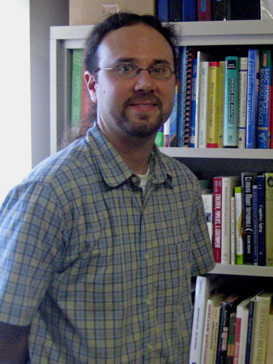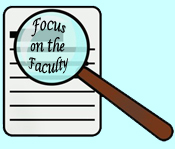Department of Psychology


Colleagues and students would describe Dr. Adam Doughty as very passionate about his profession and research. He is known to be very interactive with students and has completed a cornucopia of research here at the College of Charleston.
Graduating from West Virginia University, Doughty found himself interested in behavioral science early in his education. He recalls the beginning of his second semester, an introductory psychology class as sparking his interest in the field of psychology in general, and in his junior year an introductory behavioral psychology class as solidifying his interest in that specific area.
Dr. David Gentry, a fellow C of C psychology professor, said: "Dr. Doughty has had a positive impact on our students, both in the classroom and in the Best Buddies organization he helped start on our campus. In a short time after arriving on our campus, students came to know him as a very caring professional."
An organization that Doughty has started at C of C is the Best Buddies program which is part of Best Buddies International. Best Buddies International is a program reaching all 50 states and six continents, with the idea of improving the lives of people with intellectual disabilities by providing one-on-one friendships.
"I learned of Best Buddies by reading an article about it in a scientific journal related to intellectual disabilities," Doughty said. "The article was a study in which the authors discussed the reactions of students and their buddies to participating in the program. Because of the favorable reactions to the program by both the students and the buddies, I thought it was wise to initiate a program here. The program is important because it provides our students with in-depth exposure to a population that historically has been neglected by our society. It teaches them the value of being generous with their time because so little of their time can have such a significant impact on their buddies. Participation in the program also provides our students with the opportunity to be leaders on campus, teaches them about fundraising, and other useful skills."
The program was started in 1989 by Anthony Shriver, and now has a devoted following of more than 1,400 middle school, high school, and college campuses around the world. Volunteers annually contribute services to the community that equate to $70 million.
Started in fall 2006, Doughty brought the vibrant new chapter to life at our campus.
The Best Buddies program at C of C has been nominated for one of the best student organizations on campus, and has been featured in many George Street Observer articles and on the Cougar Volunteer Spirit website.
Volunteers in the program can be either "buddies" or associate members, where buddies (or college students) get paired with a person who has an intellectual disability. They keep frequent contact through e-mail, phone, and in person get-togethers to build lasting relationships.
When asked what students get out of being in the program, Megan Driggers who is an active member in the C of C chapter, said: "It makes you look outside your realm. It helps you to see that a lot of us don't have as many problems as we think we do. It's great to see these really upbeat intellectually disabled people who have such a positive outlook on life. It's very inspiring."
More information on this great organization can be found at www.bestbuddies.org.
Doughty's specific area of expertise in psychology is in behavior analysis. "Behavior analysis is an approach to understanding behavior change based on the operation of only a few basic behavioral principles," he said. "My specific program has two strands: studying behavioral processes in animal models and investigating how these same principles can be used to better understand psychological topics relevant to individuals with intellectual disabilities."
Behavioral fluency, resurgence and stimulus over-selectivity are some of the specific topics studied.
Doughty says he enjoys bringing his research into the classroom, saying, "It's important for students to be exposed to newly emerging research advances, because textbooks usually lag several years behind the primary literature."
Students have responded with only positive feedback for him sharing and engaging them in his research.
After completing his post-doctoral work at the University of Kansas, Doughty found himself very interested in teaching and doing research at the College of Charleston. Doughty's first time in Charleston was when he was interviewing for his position but soon realized it was a perfect fit. One of his main reasons for picking C of C was that there are "very few times and places where you can set up a research program with both humans and animals."
Doughty strives to make himself available to his students in order to help them succeed. He has been involved in the College's summer undergraduate research with faculty (SURF) program. This is a 10-week program where students work with faculty members for 40 hours a week to complete research, with additional pay at the end of their 10 weeks. Students are allowed to apply for grants and are involved in every aspect of the research process.
Doughty has accomplished a lot during his time at the College of Charleston. However, he continues to build on his profession and explore different topics within behavioral science. "To help people is very rewarding, especially when we can analyze behavioral patterns and learn from them," he said.
Doughty's main goal in his research is to provide effective ways that try to improve how people function in everyday life.
Currently, Doughty is working on research projects including: "Behavioral fluency under conditions of equated reinforcement and practice," "Understanding human responding under nonverbal transitive-inference procedures" and "Experimenter-imposed delays attenuate disruptive effects of negative-incentive shifts in humans."
Doughty says there is no grand plan with his research, but he is motivated by that fact that behavioral science provides him "an effective way of thinking about the world. It just works for me, I am very pragmatic."
###